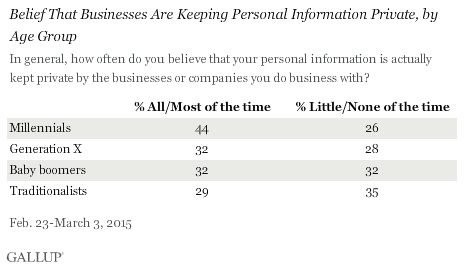
Having grown up in an age where everything—dating, shopping, news, etc.—is online, it would seem safe to assume that millennials are skeptical about their privacy.
They know that hackers and identity thieves often target e-commerce and social media websites, that big government collects cell phone and Internet data for who knows what, and that employers now essentially "Facebook stalk" job applicants for personal information shared with "friends" and "followers."
Yet, a Gallup poll released on Monday suggests that millennials are actually the most trusting generation of all major U.S. age groups.
In spite of recent high-profile data breaches such as the Sony Pictures Entertainment hack, not to mention the latest news in government spying, 44-percent of millennials believe that their personal information is kept private “all” or “most of the time.”
Just 26-percent believe that their personal information is kept private “little” or “none of the time” by businesses or companies they deal with online. The remaining 30-percent believe their personal information is kept private “some of the time.”
On the other end of the spectrum are traditionalists, or Americans aged 70 or older. Far more doubtful, only 29-percent of traditionalists believe their personal information is secure.

Americans as a whole appear skeptical. Gallup explains:
“Overall, 36% of Americans believe their personal information is kept private all or most of the time, with 31% saying it is kept private little or none of the time. A third (34%) say it is kept private some of the time.”
But why are millennials the most trusting?
It would make sense that they be the most skeptical knowing well the inherent risks of Internet use—with their vulnerable Wi-Fi connections, online purchase transactions, and iCloud accounts. Still, millennials show confidence in their personal security.
Gallup suggests a couple theories, one being that millennials hold businesses and companies using technology to a higher standard, trusting them to be just as, if not more, familiar with the risks, and to take precautionary measures that would keep consumers’ personal information safe if a breach were to occur.
Another possible hypothesis is that millennials have the least life experience of all the major U.S. generational groups, and are therefore naïve about personal privacy online.
Either way, millennials’ trust level in the face of recent security breaches and online terror threats raises some red flags.
